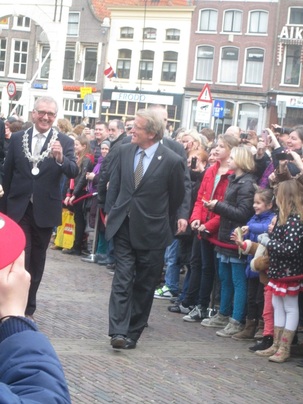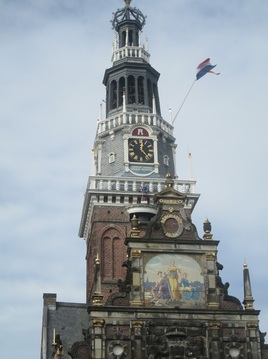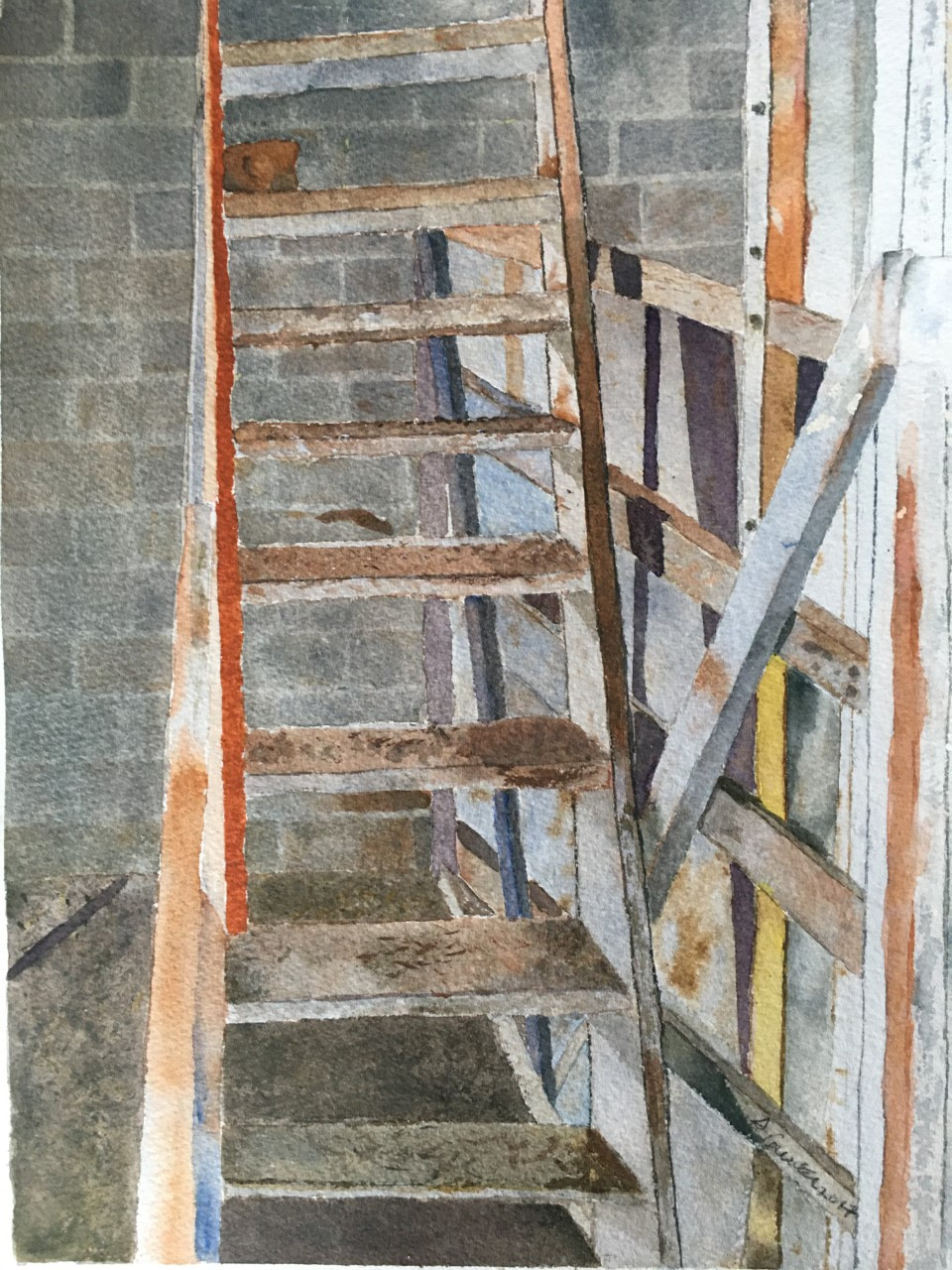The Mouse King; 11 March 2014
Pussy cat pussy cat, where have you been?
I’ve been to London to visit the queen.
Pussy cat pussy cat, what did you there?
I frightened a little mouse under the chair.
This is has been a long hiatus—I have been traveling, to Provence to visit Bill’s niece and her daughters and then to Amsterdam, for a house trade. Traveling is one of the things baby boomers do in retirement; it is wonderful to see the world another way around.
However, I don’t know about you, but I get tired of reading straight travelogues. They hold my attention for awhile, but then I wander off, musing,
“Why didn’t I go there? When is my next trip? I remember when I visited. . . “
on and on. There is really no point in recounting one’s activities blow by blow, but sometimes it works to recount just one event that might give the flavor of a place. In my case, this incident was a chance encounter with the King of the Netherlands, King Wilhelm-Alexander.
During one of our nine days in Amsterdam, we took one of Holland’s incredibly efficient trains to the small town of Alkmaar, where there is a museum dedicated to the history of regional cheese making. We also wanted to buy some cheese, of course, to smuggle back to the States in our luggage. We arrived with minimal difficulty and wandered around the town for an hour or two—a visual treat as these small towns have beautiful seventeenth century brick houses that cast soft reflections in the many canals. We found a lunch place and dined on the most wonderful soup I ever had, a wild mushroom bisque. Amazing. I mused out loud,
“Why does the richest country in the world have the worst food?”
It seemed a good time to visit said cheese museum, so after our coffee we wandered across the town square to the spectacular building, replete with ornate carvings and gilded trim. We had noticed earlier that there were long velvet ropes around the outside of the museum—to organize the lines? We weren’t sure, as on a Thursday afternoon there were very few people walking (or biking, the preferred mode of transportation) in the town center. We walked up to the entrance and a man in a dark blue suit stopped us.
“The museum is not open.”
“Why not? We thought your hours were from 10 a.m. to 4 p.m. daily.”
“The King is coming.”
And with no further explanation he turned on his heel to speak to the woman behind him.
Well, now I was curious. What king? And why on earth would he visit the cheese museum? If this were the King of the Netherlands, surely he knew all about cheese. We decided to wait around a bit to see what would happen.
Sure enough, within ten minutes a small crowded started to gather at the edge of the red ropes, which now stretched from the museum door to the very end of the stone paved square. I must have looked like a quizzical tourist (I did look a tourist, with map in hand and small camera around my neck), because a woman about my age standing near me announced that the King of the Netherlands was coming to preside over the official opening of the newly renovated cheese museum.
Good grief. The chance to be next to a member of the monarchy—this is something on a par with having Robert Redford as co-honoree when I received my honorary doctorate at Westminster last May! (I tell everyone that I was invited because that insured there would be lots of media attention for the ceremony.) Why not stay? I asked the woman if she knew when Sir King would arrive—she asked the people around her. The consensus was 2:30 PM. Since that meant we only had a little over half an hour to go, we decided to keep our place in the front row and watch this event.
Things grew livelier. Cheese maidens strolled about with trays of individually wrapped Gouda samples. They were dressed in white blouses, black slacks, long red aprons, and wore black high heels—hardly the thing for walking on those old cobblestones, but they seemed to manage well. All of them but one had long blonde hair and all wore very bright red lipstick.
Now groups of police swooped in on bicycles, wearing neon green vests and dark uniforms. Most of them dismounted near the entrance and stood chatting with one another, though two of them did ride their bikes around the square and on adjacent streets. I looked around me and at the surrounding area. No one had been screened. There was no weapons detector. Worse, the four story buildings around the square had many large windows. Fleetingly I thought of Lee Harvey Oswald and the book depository in Dallas. Not a worry here, evidently. Obviously there are advantages to having a constitutional monarchy—first, the royal person does not have to face elections, and second, there is no immediate advantage to bumping off the wearer of the crown, as typically today royalty has little say in the actual running of the country. It must be a relief to have such a stable institution at times—think of our political scene now, for instance. There seems to be almost no one with any gravitas in Washington to steer a sane path to the future.
Members of the press started to flock in, some carrying huge cameras. They also stood in a group near the museum’s front and chatted, a few smoking. One woman, who must have been a news anchor, found a woman in the crowd to interview and film.
And of course he was late—the King, that is. It was chilly and windy that day, and I was beginning to think we should walk back to the train, when suddenly we heard a helicopter. A bright yellow copter came into view, making smaller and smaller circles. (Later I read that this king is an avid pilot, so he may have been flying the aircraft himself.) And a few minutes later, people started talking loudly and the press rushed forward clicking wildly. It was the King.
At first I thought the town mayor was the King, a man wearing a bright ceremonial necklace. (Well, I can be forgiven—it was my first time with royalty, after all.) There was a pleasant looking forty-something man next to him, smiling broadly and waving enthusiastically to all in the crowd. The king, at last. Within two minutes he was inside the factory, and my brush with greatness was over. . . .
Back on the train, I suddenly started laughing. I thought out loud of how much President Obama might give right now to have Wilhelm-Alexander’s daily schedule. I imagined our president waking in the morning and his assistant handing him the agenda.
“Here is your agenda for March 6, sir. First you will breakfast. Then you have an hour to exercise before going to your correspondence. After a light lunch, you will pilot Air Force Helicopter One to Alkmaar to open the cheese museum.”
Enough said. I have thought many times how wonderful it must be to live in a small, neutral country. I bet Obama has thought this, too.
I won’t write next week as we are off to northern California for our granddaughter Abby’s fourth birthday, but I hope to resume more regular postings after that!
Pussy cat pussy cat, where have you been?
I’ve been to London to visit the queen.
Pussy cat pussy cat, what did you there?
I frightened a little mouse under the chair.
This is has been a long hiatus—I have been traveling, to Provence to visit Bill’s niece and her daughters and then to Amsterdam, for a house trade. Traveling is one of the things baby boomers do in retirement; it is wonderful to see the world another way around.
However, I don’t know about you, but I get tired of reading straight travelogues. They hold my attention for awhile, but then I wander off, musing,
“Why didn’t I go there? When is my next trip? I remember when I visited. . . “
on and on. There is really no point in recounting one’s activities blow by blow, but sometimes it works to recount just one event that might give the flavor of a place. In my case, this incident was a chance encounter with the King of the Netherlands, King Wilhelm-Alexander.
During one of our nine days in Amsterdam, we took one of Holland’s incredibly efficient trains to the small town of Alkmaar, where there is a museum dedicated to the history of regional cheese making. We also wanted to buy some cheese, of course, to smuggle back to the States in our luggage. We arrived with minimal difficulty and wandered around the town for an hour or two—a visual treat as these small towns have beautiful seventeenth century brick houses that cast soft reflections in the many canals. We found a lunch place and dined on the most wonderful soup I ever had, a wild mushroom bisque. Amazing. I mused out loud,
“Why does the richest country in the world have the worst food?”
It seemed a good time to visit said cheese museum, so after our coffee we wandered across the town square to the spectacular building, replete with ornate carvings and gilded trim. We had noticed earlier that there were long velvet ropes around the outside of the museum—to organize the lines? We weren’t sure, as on a Thursday afternoon there were very few people walking (or biking, the preferred mode of transportation) in the town center. We walked up to the entrance and a man in a dark blue suit stopped us.
“The museum is not open.”
“Why not? We thought your hours were from 10 a.m. to 4 p.m. daily.”
“The King is coming.”
And with no further explanation he turned on his heel to speak to the woman behind him.
Well, now I was curious. What king? And why on earth would he visit the cheese museum? If this were the King of the Netherlands, surely he knew all about cheese. We decided to wait around a bit to see what would happen.
Sure enough, within ten minutes a small crowded started to gather at the edge of the red ropes, which now stretched from the museum door to the very end of the stone paved square. I must have looked like a quizzical tourist (I did look a tourist, with map in hand and small camera around my neck), because a woman about my age standing near me announced that the King of the Netherlands was coming to preside over the official opening of the newly renovated cheese museum.
Good grief. The chance to be next to a member of the monarchy—this is something on a par with having Robert Redford as co-honoree when I received my honorary doctorate at Westminster last May! (I tell everyone that I was invited because that insured there would be lots of media attention for the ceremony.) Why not stay? I asked the woman if she knew when Sir King would arrive—she asked the people around her. The consensus was 2:30 PM. Since that meant we only had a little over half an hour to go, we decided to keep our place in the front row and watch this event.
Things grew livelier. Cheese maidens strolled about with trays of individually wrapped Gouda samples. They were dressed in white blouses, black slacks, long red aprons, and wore black high heels—hardly the thing for walking on those old cobblestones, but they seemed to manage well. All of them but one had long blonde hair and all wore very bright red lipstick.
Now groups of police swooped in on bicycles, wearing neon green vests and dark uniforms. Most of them dismounted near the entrance and stood chatting with one another, though two of them did ride their bikes around the square and on adjacent streets. I looked around me and at the surrounding area. No one had been screened. There was no weapons detector. Worse, the four story buildings around the square had many large windows. Fleetingly I thought of Lee Harvey Oswald and the book depository in Dallas. Not a worry here, evidently. Obviously there are advantages to having a constitutional monarchy—first, the royal person does not have to face elections, and second, there is no immediate advantage to bumping off the wearer of the crown, as typically today royalty has little say in the actual running of the country. It must be a relief to have such a stable institution at times—think of our political scene now, for instance. There seems to be almost no one with any gravitas in Washington to steer a sane path to the future.
Members of the press started to flock in, some carrying huge cameras. They also stood in a group near the museum’s front and chatted, a few smoking. One woman, who must have been a news anchor, found a woman in the crowd to interview and film.
And of course he was late—the King, that is. It was chilly and windy that day, and I was beginning to think we should walk back to the train, when suddenly we heard a helicopter. A bright yellow copter came into view, making smaller and smaller circles. (Later I read that this king is an avid pilot, so he may have been flying the aircraft himself.) And a few minutes later, people started talking loudly and the press rushed forward clicking wildly. It was the King.
At first I thought the town mayor was the King, a man wearing a bright ceremonial necklace. (Well, I can be forgiven—it was my first time with royalty, after all.) There was a pleasant looking forty-something man next to him, smiling broadly and waving enthusiastically to all in the crowd. The king, at last. Within two minutes he was inside the factory, and my brush with greatness was over. . . .
Back on the train, I suddenly started laughing. I thought out loud of how much President Obama might give right now to have Wilhelm-Alexander’s daily schedule. I imagined our president waking in the morning and his assistant handing him the agenda.
“Here is your agenda for March 6, sir. First you will breakfast. Then you have an hour to exercise before going to your correspondence. After a light lunch, you will pilot Air Force Helicopter One to Alkmaar to open the cheese museum.”
Enough said. I have thought many times how wonderful it must be to live in a small, neutral country. I bet Obama has thought this, too.
I won’t write next week as we are off to northern California for our granddaughter Abby’s fourth birthday, but I hope to resume more regular postings after that!



 RSS Feed
RSS Feed